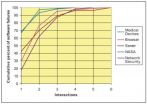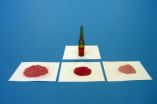(Press-News.org) A Finnish study confirms the hypothesis that infant feeding plays a role in the initiation of the disease process leading to type 1 diabetes in children carrying increased genetic disease risk.
The study population comprised 230 newborn infants with at least one family member affected by type 1 diabetes and a predisposing genotype based on screening cord blood at birth. The participants were randomized into two groups; the infants in the intervention group were weaned to a highly hydrolyzed casein-based formula (Nutramigen, Mead Johnson Nutrition), while those in the control group were weaned to a regular cow's milk-based formula supplemented with 20% Nutramigen to make the two formulas comparable in terms of smell and taste. The intention was that the participants should be exposed to their study formula for at least 2 months by the age of 6 months, or if exclusively breast-fed up to that age by the age of 8 months.
The study participants were observed up to the age of 10 years for the appearance of diabetes-predictive autoantibodies and progression to type 1 diabetes. Twenty-five children (12%) developed at least two diabetes-predictive autoantibodies out of the five tested for, which marks a high risk of presenting with clinical diabetes. Seventeen children tested positive for two or more autoantibodies had been randomized to the control group (16%), whereas seven belonged to the intervention (casein hydrolysate) group (7%). Nine children (8%) in the control group presented with clinical diabetes by the age of 10 years, while four of those (4%) who had been exposed to the casein hydrolysate progressed to clinical disease
Professor Mikael Knip of the Hospital for Children and Adolescents, and University of Helsinki, who has been responsible for the analyses of diabetes-predictive autoantibodies states: "The study showed that the safe and simple dietary intervention applied in this pilot trial was capable of reducing the emergence of diabetes-predictive autoantibodies by about 50% by age 10 in the participants carrying increased disease risk. The current study population does not provide sufficient statistical power to definitely conclude whether an intervention of this type will reduce the frequency of clinical type 1 diabetes, although the preliminary data are promising."
A full-scale trial – TRIGR (Trial to Reduce IDDM in the Genetically at Risk) – was initiated in 2002 and is currently running in 77 study centers in 15 countries to provide a conclusive answer to the question of whether weaning to a highly hydrolyzed formula will reduce the cumulative incidence of clinical type 1 diabetes. A total of 2160 children have been randomized for TRIGR. The first end-point in TRIGR, i.e. positivity for at least two diabetes-associated autoantibodies and/or clinical type 1 diabetes by age 6, will be reached in 2013 and the final endpoint, clinical diabetes by the age of 10 in the year 2017.
The current pilot trial and the full-scale TRIGR aim at primary prevention of type 1 diabetes, i.e. to stop the initiation of the disease process which lasts for months and years before clinical disease manifestation. Dr. Knip emphasizes that the results indicate that it is possible to reduce the initiation of the disease process substantially by early dietary intervention in high-risk individuals. "On the other hand we have to keep in mind that this pilot trial has been performed in children with predisposing genes and a family member affected by type 1 diabetes. At this point it remains open whether this type of intervention will work in children from the general population," cautions Dr. Knip.
The researchers have not determined the decisive difference is between the casein hydrolysate and regular cow's milk-based formulas. An experimental study recently showed that a highly hydrolyzed formula reduces gut permeability and has a beneficial effect on gut microflora. Studies have been initiated to identify the mechanism(s) by which the highly hydrolyzed formula protects against beta-cell autoimmunity represented by diabetes-predictive autoantibodies.
Another Finnish trial is currently testing the hypothesis whether an insulin-free formula decreases the initiation of the diabetic disease process in children at risk given the central role of insulin as an early autoantigen in type 1 diabetes.
###
Professor Hans K. Åkerblom was the Principal Investigator for the current pilot trial, which was performed at the University of Helsinki, Helsinki University Central Hospital, the University of Kuopio, the University of Oulu, the University of Tampere, the University of Turku, Tampere University Hospital, the National Institute for Health and Welfare and nine central hospitals, all in Finland. In addition, the University of Toronto, Ontario, Canada, was involved in the study.
The study was supported by the European Union, the Juvenile Diabetes Research Foundation, the Academy of Finland, Helsinki University Central Hospital, the University of Helsinki, the Finnish Diabetes Research Foundation, the Novo Nordisk Foundation, the Medical Research Foundation of Tampere University Hospital, the Dorothea Olivia, Karl Walter, and Jarl Walter Perklén Foundation, and the Liv och Hälsa Fund.
END
EAST LANSING, Mich. — In a major breakthrough that comes after decades of research and nearly half a billion treatments in humans, scientists have finally unlocked how a key anti-parasitic drug kills the worms brought on by the filarial diseases river blindness and elephantitis.
Understanding how the drug ivermectin works has the potential to lead to new treatments for the diseases, in which the body is infected with parasitic worms, said Charles Mackenzie, a professor of veterinary pathology in the College of Veterinary Medicine and researcher on the project. The diseases ...
New hemlock hybrids that are tolerant to the invasive insect known as hemlock woolly adelgid have been created by U.S. Department of Agriculture (USDA) scientists.
Geneticist Richard Olsen and horticulturist Sue Bentz of USDA's Agricultural Research Service (ARS) teamed up with Forest Service entomologist Mike Montgomery to breed and select these tolerant hybrids. Olsen and Bentz work in the U.S. National Arboretum's Floral and Nursery Plants Research Unit in Beltsville, Md. The arboretum is located in Washington, D.C., and is operated by ARS, the principal intramural ...
Gone are the days when a doctor's only way of helping patients is by treating the disease after symptoms have started. Instead, a new approach to medicine, called "Desktop Medicine" is emerging, in which the emphasis shifts from diagnosing diseases and treating symptoms to identifying risk-factors for medical conditions such as hypertension and osteoporosis, and intervening before they develop. The commentary appears in the current issue of the Journal of the American Medical Association.
"Desktop medicine," a model defined by Jason Karlawish, MD, Associate Professor ...
By the end of this year, colonoscopy screening will have prevented bowel cancer in approximately 99 000 people since it was introduced in Germany. This is the result obtained by Hermann Brenner of the German Cancer Research Center in Heidelberg and his co-authors in their interim assessment conducted eight years after the procedure was added to the German cancer screening program. The authors present their projection and initial results of colonoscopy screening in Germany in the current edition of Deutsches Ärzteblatt International (Dtsch Arztebl Int 2010: 107(43): 753 ...
Researchers at the National Institute of Standards and Technology (NIST) have released an updated version of a computer system testing tool that can cut costs by more efficiently finding flaws. A tutorial on using the tool accompanies the new release.
Catching software "bugs" before a program is released enhances computer security because hackers often exploit these flaws to introduce malware, including viruses, to disrupt or take control of computer systems. But it's difficult. A widely cited 2002 study prepared for NIST* reported that even though 50 percent of software ...
A team of researchers from the University of Minnesota's College of Liberal Arts and College of Science and Engineering have found that an early part of the brain's visual system rewires itself when people are trained to perceive patterns, and have shown for the first time that this neural learning appears to be independent of higher order conscious visual processing.
The researchers' findings could help shape training programs for people who must learn to detect subtle patterns quickly, such as doctors reading X-rays or air traffic controllers monitoring radars. In addition, ...
National Institute of Standards and Technology (NIST) researchers have developed new certified reference materials for measuring amounts of organic acids in dietary supplements formulated with Vaccinium berries—cranberries, blueberries and bilberries. As described in a recent paper,* manufacturers and researchers can use this new suite of standard reference materialsTM (SRMs) as quality assurance tools.
berry SRMs
Dietary supplement manufacturers often include health claims on products made with Vaccinium berries. Suggested benefits include prevention of urinary tract ...
Many aspects of the German Genetic Diagnostics Act (Gendiagnostikgesetz) are out of touch with the latest technology, almost impossible to implement in clinical practice, or even detrimental to the success of recognised screening tests, such as newborn screening. The Act, which came into force in February 2010, is in desperate need of amendment. This was the conclusion reached by the Academy Workgroup "Predictive genetic diagnostics as an instrument of disease prevention" of the German Academy of Sciences Leopoldina, the Berlin-Brandenburg Academy of Sciences and Humanities ...
Using a neutron beam as a probe, researchers working at the National Institute of Standards and Technology (NIST) have begun to reveal the crystal structure of a compound essential to technologies ranging from sonar to computer memory. Their recent work* provides long-sought insight into just how a widely used material of modern technology actually works.
The compound is a "piezoelectric," a material capable of changing one kind of energy into another—mechanical to electrical, or vice versa. Long employed in sonar systems to detect sound waves, more recently piezoelectrics ...
VIDEO:
Wireless. For most, the word conjures images quaint coffee shops or busy airport lobbies -- places where people drop in to check on business or check in with other people.
But...
Click here for more information.
BEAUMONT – Wireless. For most, the word conjures images quaint coffee shops or busy airport lobbies – places where people drop in to check on business or check in with other people.
But increasingly "wireless" is showing up on the farm to help produce better ...



